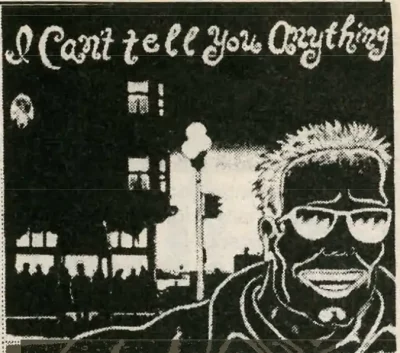Literature: I Can’t Tell You Anything by Michael Dougan
Archived
For those who don’t think there are any good cartoon collections being published anymore, I have a surprise: “I Can’t Tell You Anything,” by Michael Dougan.
Dougan, whose work has previously appeared in Drawn & Quarterly magazine and The L.A. Weekly (among others), weaves good, old fashioned tales of love, greed, car troubles and more with folksy charm.
 Most of the tales are biographical or autobiographical, save the book’s one misfire: “The Casanova of Kilgore County.” This tale concerns plump bank teller Mrs. Dorothy Tremor and her chance encounter, and eventual tryst with one Joshua Madley. Or does it? The conclusion to this one almost manages to salvage the story, but not quite.
Most of the tales are biographical or autobiographical, save the book’s one misfire: “The Casanova of Kilgore County.” This tale concerns plump bank teller Mrs. Dorothy Tremor and her chance encounter, and eventual tryst with one Joshua Madley. Or does it? The conclusion to this one almost manages to salvage the story, but not quite.
Happily, the rest of the material more than makes up for that one lemon. The “car” stories (“Car Trouble,” “Let’s Get Lost,” “Starting Over,” “Car Trouble in L.A.,” “The Bigger the Car … The Closer to God” and “Car Trouble: The Final Frontier”) illustrate Dougan’s years of trouble with modern man’s favorite mode of transportation, as the author has one harrowing experience after another with cars and mopeds.
But the highpoints to the collection are definitely “Opportunity Jones,” “Black Cherry,” and the “Chicken Story” trilogy. In the first (the book’s last chapter), Dougan is offered the opportunity for riches by a customer in the coffee store in which Dougan works. This hilarious work details the frustration of workers in demeaning jobs perfectly. As Dougan is pulled in by big-haired Othman Oglesby, the reader sympathizes with his plight, only to share Dougan’s dismay when Oglesby’s secret is revealed.
Likewise, “Black Cherry” finds Dougan employed as a shift worker in an ice cream parlor and pondering the lives of those who frequent the establishment, especially “the black cherry men” who “paid with exact change, sat at his table, and stared out the window” after ordering the same soda everyday.
With “Chicken Stories: A Trilogy,” Dougan excels, however. These three tales comprise a whole with the unifying theme being chickens. Dougan and two pals explore the gamut of human emotions.
The delight to “I Can’t Tell You Anything” comes from Dougan’s lean cartooning style, which reminds me of Lynda Barry, but Dougan manages to capture the essence of just what it means to be human. The facial expressions in particular (especially on the faces of the ever-changing cast of lunatics) is especially impressive.
But the ultimate credit for Dougan’s success must go to his charm and wit. Dougan’s narrative style is relaxed and warm, making the characters much more real and familiar. Despite the losers and nuts he describes, Dougan never comes across as judgemental or superior and this makes the work that much more thoughtful.
I could go on rambling about the merits of “I Can’t Tell You Anything” all day, but instead I’d recommend that you pick up a copy instead. At $14.00 for 216 pages, it might seem a bit expensive, but trust me, it’s money well spent. If the meaning of the universe can be found by studying the mundane, then we need more storytellers like Michael Dougan.
Check out more from the SLUG Archives:
Literature: April 1993
Literature: February 1993
